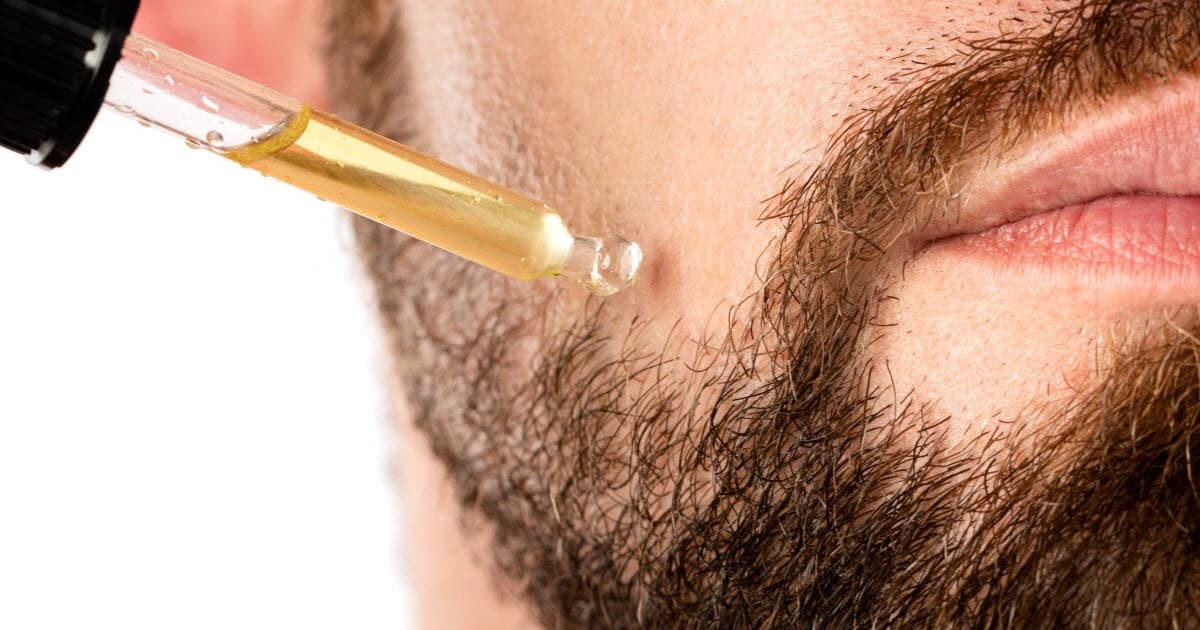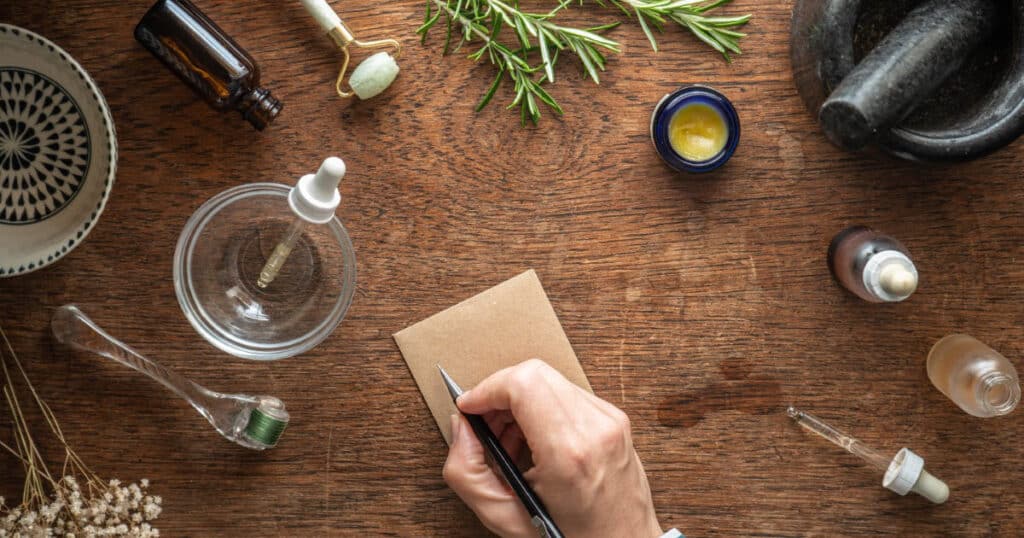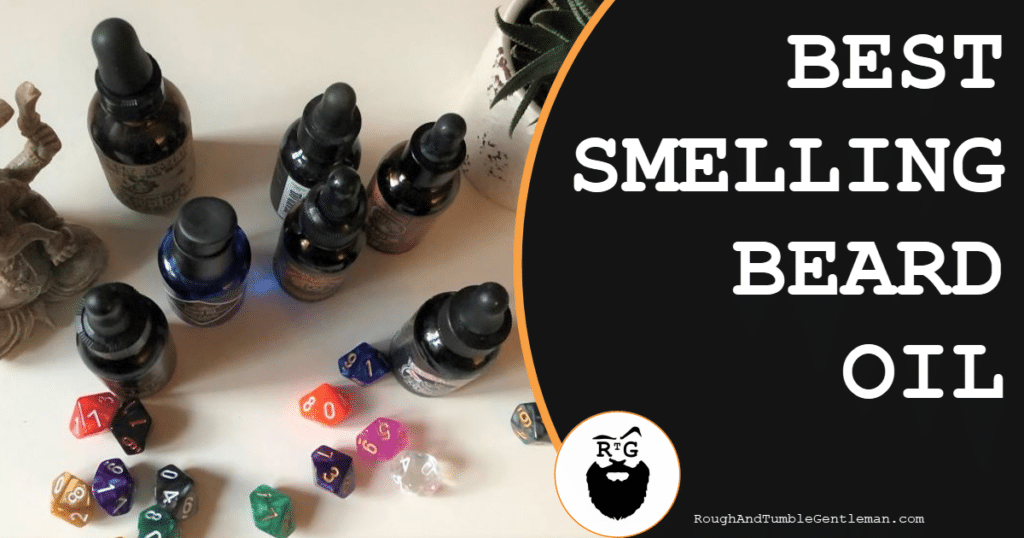When it comes to grooming supplies, Argan oil is one of the most popular natural ingredients in the world, and every year it’s included in hundreds of new products. You may know it as “Moroccan oil,” or if you’re a “science-y” type, you may know it as argania spinosa oil, but if you’re at all connected to the products you use on your skin and in your hair, you’ve probably come across it more than once—maybe without even knowing it. So what is it, and what are the benefits of Argan oil for beard health?
Why is it so popular? Is it worthy of the hype—and it is really all that great?

In this post, we examine argan oil, its benefits, and its uses from every angle, to help you figure out if you need it in your skin, hair, and beard care routine.
We’ll start at the beginning:
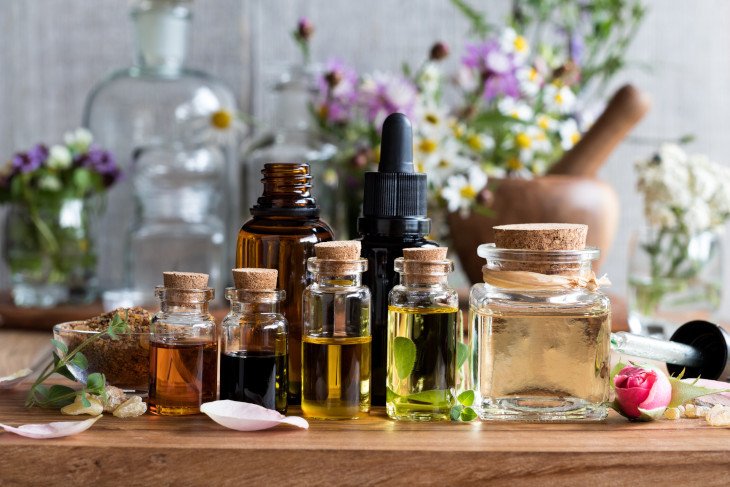
What is Argan Oil?
To get started, there’s a basic question we have to answer: what is argan oil, exactly? Well, as the name suggests, it’s an oil (which, by the way, isn’t always the case! Some of the ingredients we call oils, like jojoba oil, squalane oil, and all essential oils aren’t oils at all.)
Argan oil is extracted from the kernels of the argan fruit, which grows on the Argania spinosa tree (i.e. the argan tree). Here’s what it looks like on the branch:
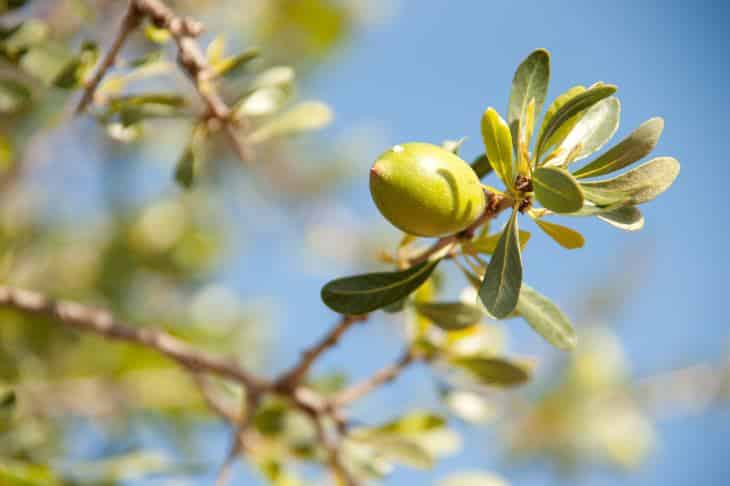
Where Does Argan Oil Come From?
Argan trees are native and unique to a semi-desert region in southwestern Morocco called the Sous valley.
A large part of the area is a UNESCO reserve (called the Arganeraie), and the production of argan oil in it is very important for the preservation of local habitat. The production also supports the socio-economic well-being of the communities that live in the region, giving them an eco-friendly means of making a living.
With many popular natural ingredients, like avocado and quinoa, there can be a hidden negative impact either on the people living where it is grown or on the environment. Thankfully, with argan oil, this isn’t the case at all for the most part, as this ingredient is sustainable, eco-friendly, and beneficial to the local communities that produce it.
How is Argan Oil Produced?
Within the argan fruit there is a nut, and within that nut there are usually two or three seed kernels. In most commercial argan oil sold for cosmetic and grooming purposes, the raw seeds are cold-pressed in between two stones. This process expels the oil without damaging its natural structures and helps it retain a longer shelf-life.
There is also edible argan oil, which is different. The edible oil is usually made out of roasted argan seeds, so it has a delicious flavor but fewer beneficial compounds and a shorter shelf-life.
What’s in Argan Oil?
Botanical oils are quite complex since they’re made up of different fatty acids as well as other trace constituents. While exact quantities vary from batch to batch, argan oil generally contains the following components:
First, it’s rich in oleic acid, which is a rich fatty acid that reduces signs of dryness and works well in synergy with other fatty acids.
Next, linoleic acid balances out oleic acid. It’s a lighter fatty acid said to help calm the skin and support its barrier functions. Finally, argan oil contains a bit of creamy palmitic and stearic acids, as well as trace amounts of linolenic acid, palmitoleic acid, and arachidic acid.
In addition to fatty acids, argan oil also contains vitamin E (one of our favorite anti-aging ingredients) and many antioxidant phenols including epicatechin and catechin. Remember them—they’ll come up again in this post!
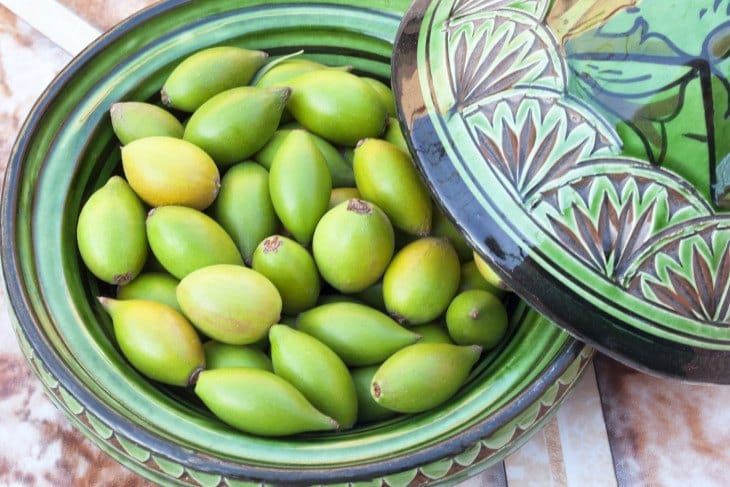
General Benefits of Argan Oil
If you’re looking to add argan oil to a specific part of your grooming routine, you can keep on scrolling. First, however, we’ll discuss its overall benefits—maybe you’ll realize it’s worth using in a few different ways!
Moisturizing. As is often the case with plant oils, the biggest benefit of argan oil (at least from a grooming standpoint) is that it’s very moisturizing. Whether eaten or applied topically to the skin, argan oil helps to fortify the skin’s barrier functions, thanks to its balance of linoleic and oleic acids. This means that the skin becomes a better barrier against water loss and dehydration, and it’s able to maintain higher water content.
Antioxidant Effects. As mentioned earlier, argan oil is rich in multiple antioxidant compounds including vitamin E. It exhibits strong anti-oxidative effects, which means that it can neutralize the damage caused by oxidation (a chemical chain reaction that destroys cells and leads to everything from rust on metal to premature aging to cancer). The antioxidant effects make it a great anti-aging oil, and are also behind its other benefits like the soothing effect and its positive impact on the human body when consumed.
Anti-Inflammatory. Argan oil may have anti-inflammatory effects. While there hasn’t been a ton of research directly on argan as a soothing agent, there is quite a bit of proof that some of its components, like linoleic acid and catechin polyphenols, exhibit anti-inflammatory effects. This means it might be able to soothe irritated or red skin when applied topically.
Pleasant Texture. Argan oil has a pleasant texture, which we think is a big bonus. It’s not a thick, greasy oil, but it’s also not overly light or astringent the way castor and grapeseed oils can be. On the skin and hair, we find that once it sinks in, it feels fairly silky. It may not be as big of a deal as all of its health-related effects, but we appreciate any ingredient that feels good on our beard or face.
Argan Oil Uses
How do you use argan oil? As with many other oils, it’s a versatile ingredient, so there are a lot of ways to use it! We discuss a few of these in more detail throughout the guide, but here’s a quick summary of the ways argan oil is commonly used.
As a face oil. Argan oil can be a magnificent face treatment that helps the skin in a few different ways. Both men and women like to use it as face oil, especially after shaving or in the evening to lock in moisturizer. Its various antioxidant, moisturizing, and soothing benefits make it helpful even when used alone.
As a leave-in hair or beard product. Both the beard and hair can benefit from argan oil as a leave-in product. It can be used on its own, or as part of an oil or hair serum blend. Its protective abilities also make it helpful before showering or shaving, to protect the skin and hair.
In products that contain it. Argan oil can be found in many different products! We discuss this in more detail later on in the guide.
In food. Argan oil can be eaten! In Morocco, it’s frequently used as a dipping oil or in a sweet paste with almonds. The same fatty acids and antioxidant compounds that make it so good for the skin also make it a very healthy oil to eat, but it does have a fairly low smoke point so it’s better not to cook with it.

Argan Oil for the Face
We’ve already covered some of argan oil’s skin benefits, but should you be applying it to your face?
How and whether you even should use argan oil for the face largely depends on your skin type, so keep reading to decide for yourself.
Argan Oil is Amazing for Dry Skin. Dry skin doesn’t produce a lot of oil, so argan oil can help compensate for that. The oil’s simple moisturizing ability and fatty acid content fortify the skin barrier and prevent moisture evaporation, which helps deal with dry skin and undo flakiness. It’s especially nice after shaving when the skin can be a little more irritated.
If you have dry skin, there are a few different ways you can introduce argan oil into your routine. You can use the oil on its own, as a final sealing layer after you’ve applied face lotion. You can also look for skincare products (especially leave-on ones) that include it.
Be Cautious if You’re Oily. If your skin produces a lot of oils, using a topical oil can be a little unpleasant. Argan oil isn’t too greasy, but it’s not very light, either. That doesn’t mean you have to totally avoid it!
In fact, one study showed that a face cream with argan oil, sesame seed oil, and saw palmetto actually helped reduce oil production. It’s hard to say which ingredient in the cream was responsible for this effect, but what’s clear is that in a small amount, argan oil is probably fine for oily skin types. So feel free to use leave-on skincare products that contain it, but you may not like using it alone.
Combination Skin Can Experiment. Combination skin has some unique needs. Different parts of the face are dry and others are oily, so skincare becomes a balancing act. Thankfully, argan oil is a pretty balanced oil with a silky, non-greasy texture.
If you have combination skin, you can use skincare products with argan all over the face. For the dry parts of your skin, or in the winter if your skin gets dry all over, you can layer pure argan oil over your regular moisturizer for its moisture-sealing effects.
Sensitive Skin Triumphs with Argan. Sensitive skin isn’t a separate skin type. You can have sensitive skin that’s also combination, dry, or oily. That said, if your skin gets red or irritated easily, then it’s probably sensitive in addition to everything else.
The good news? Argan oil is awesome for sensitive skin.
The barrier-repairing effects of its fatty acids is fantastic when your skin is aggravated, and the various antioxidants in the oil help to keep inflammation away. No matter how you introduce argan oil to your skin, it will likely appreciate its nourishing touch, so you can use it alone or use skin care products that include it.
Acne-Prone Skin May Benefit. If you experience acne-related breakouts like pimples, whiteheads, or blackheads, you will need to be careful with argan oil. On the one hand, its skin-soothing effects could do wonders for active breakouts, since inflammation is a big side effect of acne.
On the other hand, argan oil contains a not-insignificant amount of oleic acid, which may correlate with higher instances of acne. Some people with acne find that it helps their skin, while others find that it makes things worse, so while you don’t need to avoid this oil, you definitely want to use it with caution. Test it on a small area of your face for a few days to see if new blemishes form, before applying it all over.
Maturing Skin. Maybe you’re just starting to see those first signs of crow’s feet or perhaps you have quite a few proud wrinkles etched in your skin. Either way, you might be interested in the anti-aging effects of argan oil.
The antioxidant content in argan oil could be tremendously helpful at preventing some of the external damage that leads to faster skin aging. By neutralizing the effects of external aggressors, antioxidants like vitamin E and phenols help preserve the appearance of the skin.
Additionally, as the skin ages, it slowly but surely loses its ability to hang on to moisture, which contributes to overall dullness and loss of firmness. By helping the skin retain water and hydration, argan oil can give a temporary anti-aging effect, especially if it’s paired with moisturizers that are rich in directly hydrating ingredients like glycerin or hyaluronic acid.
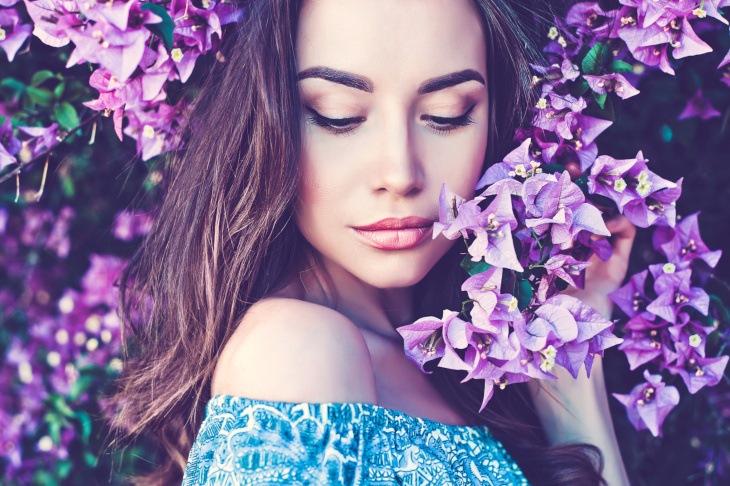
Argan Oil for Hair
While argan oil is fairly common in skincare, where it really exploded in popularity is as a hair treatment. Both on its own or in products, argan oil has become an oft-recommended remedy. So let’s learn about the benefits of argan oil for hair, and whether you should add it to your hair care routine.
The same moisturizing effects that make argan oil beneficial for the face also make it beneficial for the hair. While research on argan oil as a hair remedy is limited, there is one promising study that shows that it helps reverse some damage done to the hair with chemical processing. This effect is likely thanks to argan oil’s moisturizing and barrier-repairing abilities, which may also apply to the hair and not just to the skin.
If we look at the chemical composition of argan oil, it’s fair to predict that it helps the hair by both penetrating into the strand a little as well as by coating it from the outside to seal moisture in. This makes it a balanced oil that could work across hair types, no matter the level of thickness, dryness, curl pattern, or porosity.
Try It as a Daily Go-To for Brittle or Damaged Hair. If your hair is quite brittle and prone to breakage, argan oil can be a nice daily hair oil. You can use it on your hair when it’s damp after a shower, especially before styling when it may help protect the hair from some of the damage.
As a deep treatment before showers, opt for a more penetrative oil like coconut oil, which also helps prevent protein loss.
Excellent for Fine or Thin Hair. Argan oil can be a lovely styling oil for those with fine or thin hair. It’s light enough not to weigh the hair down and make it look flat or greasy, but it still has enough weight to add a bit of volume.
Dry and Frizzy Hair Treatment. Those with dry hair that’s prone to frizziness or split ends will benefit the most from using argan oil as a sealant. After a shower, it can help lock in moisture into your strands. Throughout the day, it also prevents more moisture from getting in the strand and making the hair frizzy. It can also lubricate the hair follicles, to make them smoother, which makes the hair easier to detangle and style.
Once in a While Treat for Oily Hair. Those with oily hair don’t need to fear using argan oil. If your hair is longer, you can use it on the ends of your hair every few days, while you may want to use it more sparingly closer to the scalp. What you may prefer, however, is masks and hair treatments designed for oily hair that also contain some argan oil.
Dandruff-Prone Scalps Should be Cautious. Finally, those with dandruff or seborrheic dermatitis may want to speak to a doctor before using argan oil, especially near the scalp. Depending on the cause, plant oils can exacerbate these skin conditions which may be related to yeast overgrowth.
Is Argan Oil Good for Hair Growth?
For those dealing with hair loss, it’s only natural to wonder if a certain ingredient will help hair regrow. In this case, the answer is no, for the most part. Argan oil can definitely be great for the scalp, and it may help counter issues that relate to hair loss, like inflamed hair follicles or increased hair breakage due to dryness.
The most common reasons for hair loss, however, are genetic and hormonal, and for that, argan oil on its own won’t do much. That said, you can definitely use argan oil on your hair and scalp in combination with proper hair loss treatments recommended by your doctor.
Argan Oil for Beards
We’ve already talked (in detail) about the benefits of argan oil for the hair. Well, guess what your beard is made of? The same benefits argan oil offers to the hair on the head, it also offers to the hair on your face.
However, we know darn well that beard hair has some unique needs when compared to head hair, so let’s discuss those in a bit more detail.
Nourish and Tame. Argan oil is a fantastic leave-in
Relieve the Skin Below. We’ve already talked extensively about the benefits of argan oil for the face. Well, the skin under your beard could benefit from it as well! Argan oil’s moisturizing abilities and protective antioxidant components can help alleviate dry or flaky skin under the beard, so make sure to work it in close to the skin.
Post-Shave Nourishment. Some men like to use an after-shave, others prefer a lotion or balm, but if you want to keep things simple, you can apply pure argan oil. The oil, on its own, won’t hydrate your skin, but if your face is still saturated with water after you’ve shaved, the argan oil will help to lock it in and soothe the skin.
Pre-Shave Fortification. Finally, fans of pre-shave oil can experiment with argan oil on its own or in a blend. Pre-shave oils help to lock moisture into the skin before shaving, to prevent nicks and cuts, and argan oil is a decent oil for the job since it can moisturize quite well.
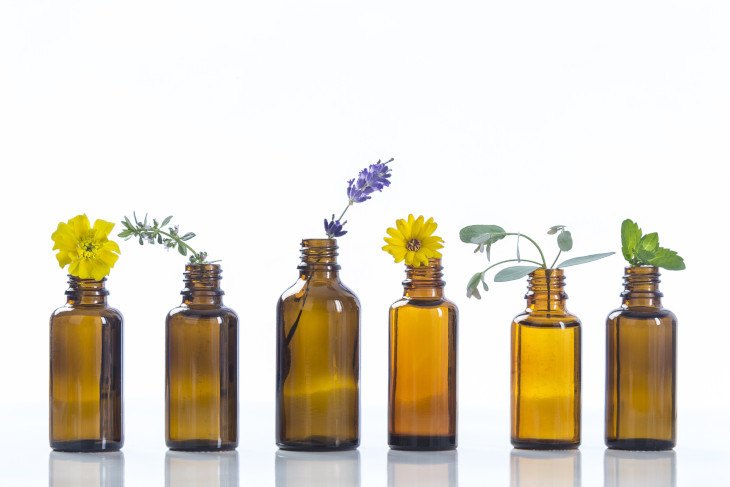
What Products is Argan Oil Used In?
Remember when we mentioned that argan oil is everywhere these days? These are some of the argan oil products you may encounter in shops and online.
Pure Argan Oil
Our favorite way to encounter argan oil is in its pure form. Many skin and hair care brands sell cosmetic-grade argan oil that buyers can use as they wish. Depending on your skin or hair type, you can use it on its own or in combination with other oils.
Just make sure that the argan oil that you’re buying is indeed cosmetic-grade, since food-grade argan oil goes through a slightly different extraction process.
Once you do pick up some pure argan oil, you can also use it to make your own DIY products, like beard conditioner or beard balm.
Argan Beard Products
There are a few ways to use argan oil on the beard, which is why there are a lot of beard products with argan oil out there. You can find argan oil-infused beard oils, balms, butters, conditioners, and even beard waxes.
Argan Shaving Products
If you’re saying goodbye to your beard (or just cleaning it up around the edges), there is no shortage of shaving products made with argan. In particular, you’ll often find argan oil in products designed for wet shavers, since they tend to be more natural and eco-friendly. It’s used in pre-shave products, shaving creams, soaps, and aftershave balms.
Argan Oil in Skincare
If a skincare product exists—and there are so many nowadays!—then a brand out there has put some argan oil in it. Sometimes it’s overkill, like in cleansers and soaps that don’t stay on the skin for very long. In other cases, it’s wonderful, like in moisturizers, serums, and face masks where the argan oil can really sink into the skin and do its magic.
Argan Oil Hair Care
Argan oil can be used on the hair all by itself, but it’s also frequently used in hair products like shampoos, conditioners, hair masks, serums, and more.
It’s important to note that most argan-based hair products don’t contain a lot of the stuff. In most cases, brands that sell “argan hair oils” or “argan hair serums” are actually selling silicone-based hair serums that contain just a little argan oil. This isn’t necessarily a bad thing, but we prefer a more natural approach to hair and beard care. When you do pick up an argan oil product, always double-check the ingredient list, so you know exactly what you’re buying.
Food-Grade Argan Oil
Finally, you can buy argan oil at the grocery store, especially if you shop at a health food store or if your local supermarket carries a lot of international products. Food-grade argan oil is made specifically for eating, so the seeds are roasted before they’re pressed into an oil. As a result, it has a delicious nutty flavor, but it shouldn’t be used on the skin, hair, or beard.

Argan Oils Side Effects
So obviously, we’re big fans of argan oil, but we’re not blinded by the hype. As with most things in life, argan oil is not entirely without potential side effects.
First of all, as far as safety and side effects are concerned, there is a risk of having an allergic reaction to argan oil. It’s not very common, and it’s more likely if you already have a nut allergy. The risk is greater if you eat the argan oil, but you may also want to be cautious when using it topically or on your facial hair.
Second, argan oil may exacerbate breakouts if you’re already acne-prone. It’s not considered comedogenic (i.e. acne-causing), but as anyone with acne will tell you, predicting what will break you out is a bit of a guessing game. A small amount of it on the tips of your beard or hair will likely be fine, but if you want to try it on your skin, do a patch test first.
Wrapping Up: Argan Oil’s Best Features…
Whether you want to use it on your face, hair, or beard, argan oil can be a potent tool with some real grooming benefits.
While we’ve listed a lot of its uses throughout this article, it has three main features that we like a lot: It’s moisturizing but non-greasy, it’s full of beneficial antioxidants, and it helps the hair both from the inside and out.
Are you going to give argan oil a try? How do you plan on using it? Leave us a comment, or jump over to our contact page to let us know!
Michael Morris is the head writer here at Rough and Tumble Gentleman. He's got a ducktail beard and loves Brazilian jiu-jitsu. He's married to the woman of his dreams and lives in Brooklyn, NY.

